Introduction: Gena Philibert-Ortega is a genealogist and author of the book “From the Family Kitchen.” In this blog article, Gena searches old newspapers to uncover the remarkable story of Helga Estby’s walk across America with her daughter in 1896—a story that was almost forgotten.
Do you ever read a book that quickly becomes a favorite because of the incredible story it tells? When this happens for me, it goes beyond just being an enjoyable read to something I want to do more research about to learn the events behind the story. I’ve had a few books affect me that way, and one of them is the story of Helga Estby as told in the book Bold Spirit: Helga Estby’s Forgotten Walk across Victorian America by Linda Lawrence Hunt.
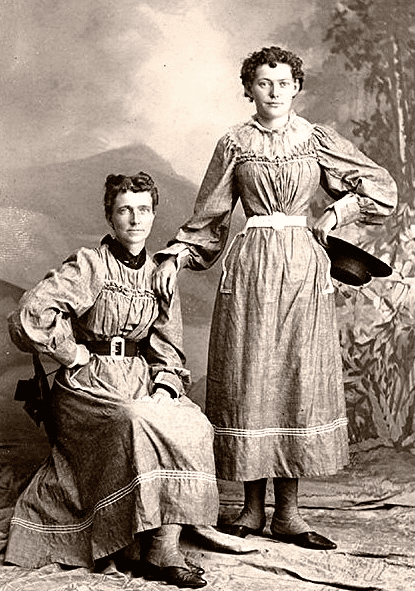
Helga Estby, a Norwegian immigrant residing in the state of Washington, lived during a time when women were doing all kinds of things that pushed the prevailing gender stereotypes. Women were climbing Pikes Peak (Victorian Women Hike to the Summit of Pikes Peak!), biking across the world, and taking on the challenge of traveling around the world in fewer than 80 days.
In many cases, women were doing these things to simply prove they could. In other cases there was a financial reward for meeting the challenge. In 1896, when Helga read in the newspaper about a challenge that would award $10,000 to any woman who walked across the United States, she decided this was the answer to her family’s financial problems.
[search_box]
Walking the Walk
In an effort to save her family’s home and gain the money they needed to pay their mortgage and taxes, Helga and her teenage daughter Clara set off from Spokane County, Washington, to walk across the United States. They hoped to arrive in New York City safe—and leave much richer. They commenced their adventure on 5 May 1896 with little to help them except a revolver (for protection) and a plan. As part of the deal they were required to walk the entire way across the U.S. (3,500 miles) and they were to earn money for their expenses along the route. As the women traveled they took on various jobs, including selling photos of themselves, in order to earn money. Their story and progress was printed in newspapers across the country.
This update from the Denver Post reports that the mother-daughter team expected to reach New York City in a little over two months’ time. At that point in September 1896 they had been walking almost four months.
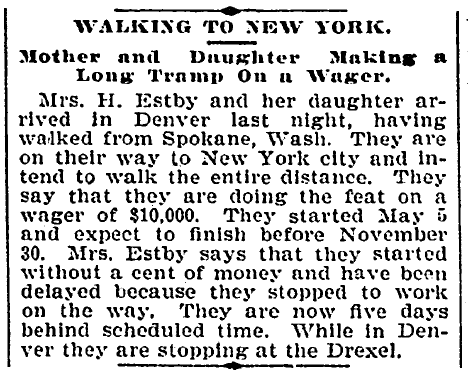
They Did It!
The two women faced all kinds of problems as they walked across America, including injury. Today, most of us would consider a drive across the United States to be quite an undertaking—but just imagine walking the whole way, with no instant communications! Despite the hardships, the women completed the entire walk, arriving in New York City in December 1896.
Newspapers heralded the women’s completion of their 3,500 mile (in some newspaper reports it’s erroneously listed as 4,600 mile) pedestrian journey. This front page article from the Cleveland Leader proclaims that the women arrived in New York at 1:30 p.m. on 23 December 1896.
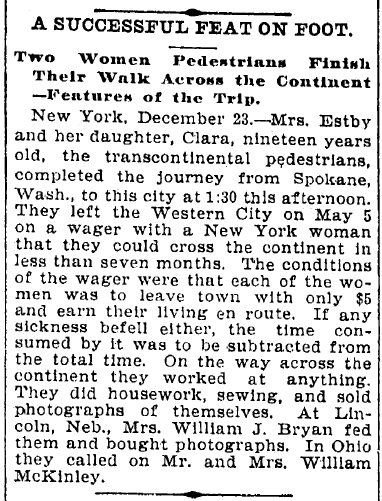
No Prize at the End of the Road
Their remarkable feat should have been celebrated and rewarded—but just the opposite happened. The challenge had been to walk across America in less than seven months. By leaving on May 5 and arriving on December 23, Helga and her daughter missed the deadline by 19 days. The sponsor of the challenge refused to pay the promised award for the remarkable journey.
Despite their determination and persistence, and all the privations the two women had suffered, the long journey was all done for nothing. Not only had the women walked all that way for no reward, they also did not have the money to travel back home. To make matters worse, Helga learned that diphtheria had struck her family during her absence; her son Olaf was sick with it, and her daughter Bertha had died.
[search_box]
This article from the Omaha World Herald reports the women’s efforts to get help from the office of charities commissioners in New York. It also includes a recounting by Helga about the unfortunate family’s years of misfortune:
For eight years we have had misfortunes. It was eight years ago that I fell one night over an obstacle in the streets of Spokane and was so badly injured that it made me sick for two years. Then I had an operation which laid me up a while and then cured me. About seven years ago my husband fell and fractured his knee cap. Afterward a horse fell on him and completely laid him up. Five years ago my daughter Ida went blind. She was treated in a hospital and is about well. Then my eldest boy got inflammatory rheumatism. Two years ago our house burned down, and as we had no insurance on it we only built up the kitchen part of it. Six weeks ago my eldest son, Olaf, had diphtheria. He was in a hospital near Spokane. He got out and went to our house. Now my daughter Bertha is dead.
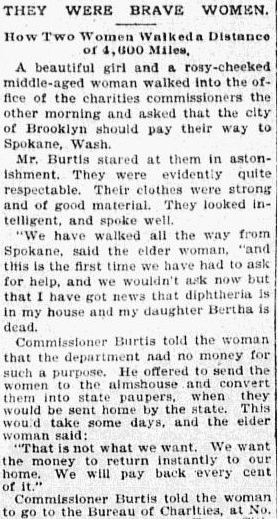
By the time the pair finally made it back home they had been gone 13 months. Once home, there was no jubilant homecoming celebration to welcome the downtrodden travelers back. Two of Helga’s children were dead from diphtheria and the family was still in financial ruin. Prevailing attitudes about women leaving their children to pursue such a dream were not favorable from the community—or from her husband and children.
While Helga’s intention was to write her story and publish it, thus making some money for her family, family pressure stood in her way. The family was so angry about her leaving them and the tragedies that happened in her absence that after Helga died her daughters saw to it that her writings were destroyed. If it were not for a defiant daughter-in-law who saved a few scrapbooks, the story of Helga’s trek across America would be lost to the family today.
Helga died in 1942 having never collected the $10,000 promised for her feat. Her notoriety continued after her long, fruitless walk. This 1905 Tacoma Daily News article summarized her journey.
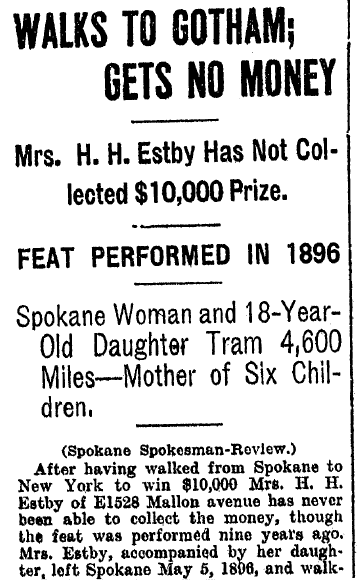
Helga’s Story Is Finally Told
Fast forward to 1984 when a young descendent of Helga’s enters his story “Grandma Walks from Coast to Coast” in a history writing contest, in which he tells the incredible tale of his great-great-grandmother who walked across the United States in 1896. This essay gets the attention of author Linda Lawrence Hunt, who then sets about trying to find the historical facts, largely through newspaper research, of this remarkable journey.*
Helga’s incredible story is one that is the perfect example of family history research. Without documentation, fantastic family stories can be lost within a few generations. And it’s through research—and, very importantly, newspaper research—that we can recreate our ancestors’ lives. I highly recommend reading Hunt’s book about Helga, and taking to heart something about your own family history that was said by that daughter-in-law who saved the story of Helga for her family: “take care of this story.”**
—————–
* Bold Spirit: Helga Estby’s Forgotten Walk across Victorian America. Moscow, Idaho: University of Idaho Press, 2003. p. xi.
** Bold Spirit: Helga Estby’s Forgotten Walk across Victorian America. Moscow, Idaho: University of Idaho Press, 2003. p. 240.
Related Articles & Resources:
- Victorian Women Hike to the Summit of Pikes Peak!
- Annie Edson Taylor: 1st Person to Barrel down Niagara Falls
- Famous Women in History (GenealogyBank Pinterest Board)
[bottom_post_ad]
